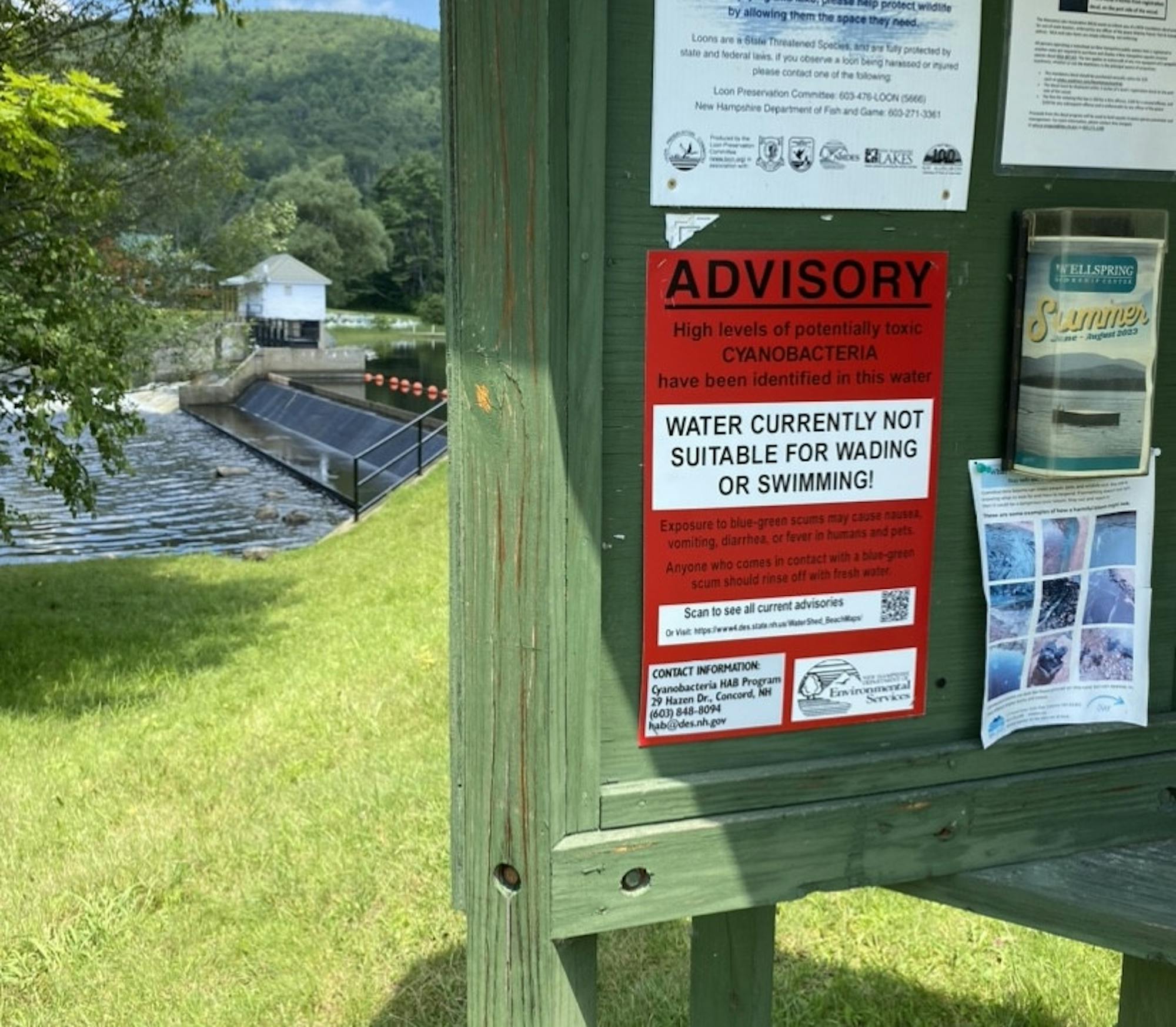On July 14, the New Hampshire Department of Environmental Services issued a cyanobacteria harmful algal bloom advisory for Mascoma Lake, according to a statement from the Lebanon Police Department. The NHDES, which conducts cyanobacteria safety tests, found that levels in Mascoma Lake reached 100,800 cells per milliliter — above the 70,000 cells/mL recreational threshold.
The statement wrote that lake-goers should avoid swimming or wading in the water, especially near blooms, while the advisory remains in effect.
“The fact that there was enough to exceed the recreational threshold is really the important cut-off that we have for our program to help keep people safe through recreation,” NHDES Cyanobacteria Harmful Algal Bloom Program Manager Kate Hastings said.
The Centers for Disease Control and Prevention describes cyanobacteria, which is a type of phytoplankton, as a blue-green colored algae. Blooms form when significant amounts of cyanobacteria build up in bodies of water, and are capable of producing toxins harmful to humans and wildlife.
Bloom growth depends on a number of contributing factors, though experts have identified water temperature, flow and turbidity as several root causes.
Recreating around areas with high cyanobacteria levels, even without physically being in the water, can also cause “chronic exposure,” Hastings said. It is possible for cyanobacteria to be inhaled through aerosols in the form of water droplets.
Depending on exposure, toxins from cyanobacteria can cause a range of health problems, from skin and nose irritation, to nausea and vomiting in milder cases, Hastings said. In rare instances, when cyanobacteria produce neurotoxins, those symptoms can include seizures, nervous system or organ failure or prove fatal, she added.
Health officials will ressample Mascoma Lake once a week until its cyanobacteria levels have returned to normal, Hastings said, adding that advisories this year have typically remained in place for one to two weeks.
Mascoma Lake serves as the training area for the Dartmouth men’s and women’s sailing teams and is home to the Dartmouth Yacht Club, which conducts undergraduate PE sailing classes in the summer.
Director of the Dartmouth Yacht Club John Brady wrote in an email statement that “[w]e have made appropriate adjustments to our programing at the sailing center for positive cyanobacteria readings,” though he did not elaborate on what those changes entailed. Brady could not be reached for further comment.
In spite of the advisory, the DYC has continued to run PE classes on its normal schedule. Heather Wang ’25, who is enrolled in a summer sailing course and spends approximately two hours every Wednesday on Mascoma Lake, said she doesn’t “see that [the DYC] have taken any extra precautions.”
“We put on the same gear, we sailed the same waters,” Wang said.
When told by an instructor about the advisory, Wang said that she and other students were given the option to use boats that were less likely to capsize in case anyone wished to avoid direct contact with the water. However, students in Wang’s PE class were not provided with specific information about potential negative health impacts prior to their lesson.
“We did not know what the actual effects were,” Wang said. “One of the students asked the instructor, and what he said was basically that he didn’t really know, either.”
Wang said that she plans to “wait and see whether the conditions on the lake improve” before her lesson next week. In order to receive their PE credit, students in sailing classes are able to miss one lesson and reschedule a second class for another time slot.
Summer sailing instructor Rebecca Risch ’25 said she has not “heard of any changes” to students’ attendance requirements that would accommodate advisory-related absences. Risch added that while she knew of cyanobacteria “vaguely,” she explained she was not previously aware of the more threatening health risks or of anyone who had personally suffered from exposure.
In terms of new safety policy, Risch said PE classes have been offering students the choice of using a Rhodes — a boat which keeps students from getting wet and requires an instructor accompaniment — rather than the more typical dinghy.
“[In] my class, everyone still wanted to sail in the dinghies, but I have heard they’ve been sending out the Rhodes more,” Risch said.
While the advisory remains in place, Wang said she plans to do further research to properly evaluate the health risks.
“I think it’s just a matter of knowing more about it and just seeing whether we should return,” Wang said.




